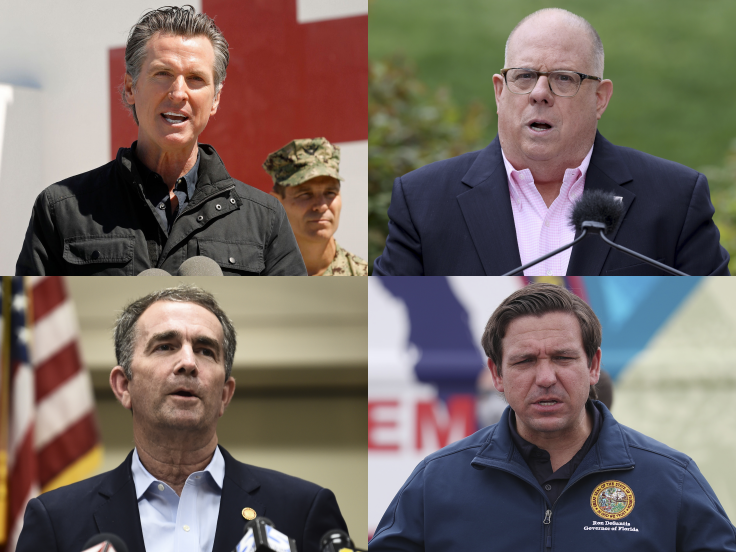Very soon, you and I will have to figure out how to navigate a semi-open America where coronavirus is a terrible fact of life. The lockdowns and stay-at-home orders that state and city governments announced in March are breaking down. This is not red-versus-blue. This is reality. Two weeks ago, Georgia's Republican governor Brian Kemp faced widespread criticism for his easing of restrictions on business and outdoor activities, even as Colorado's Democratic governor Jared Polis did the same thing. Now most states are joining in.
In the past few days, California's Gavin Newsom has said he will begin relaxing parts of his statewide directives, and so has Virginia's Ralph Northam. Maryland's Larry Hogan has announced that residents of his state will be able to undergo non-emergency medical procedures and play a round of golf. Newsom, Northam, and Hogan are not the sort of politicians likely to be swayed by a "Lockdown Rebellion" protest. The governors have been led to these decisions by the realization that blanket limitations on individual behavior have done about the best they could do.
States imposed these rules to "bend the curve" of infection so that the medical system did not become overwhelmed. The policy worked, up to a point. New York City, where Ground Zero has taken on another, equally horrible meaning, avoided the nightmare Italian scenario in which doctors had to deny care to some in order to save others. Nationwide, the curve was not so much bent as flattened. The seven-day average of cases and deaths peaked in April. It has since leveled off, and tapered somewhat. Some 1,700 deaths per day for the near future is an awful statistic to contemplate. Especially because other democracies—Taiwan, South Korea, Australia, New Zealand—were able to bring the disease under control.
America is not like them. Three are islands, and the fourth, Korea, is surrounded on three sides by water and on one side by the DMZ. America is also much bigger. We have six times the population of South Korea, and many more times the people of Australia, Taiwan, and New Zealand. We are a more diverse and less cohesive society. Our system of government is designed for inefficiency, to better protect individual liberty. Our bureaucracies show it.
America was unprepared. Unlike the smaller Asian democracies, America did not experience and thus did not learn from the SARS outbreak of 2003. George W. Bush's 2005 warning was ignored. The sense of invulnerability that comes with living between two oceans, and with allies to the north and south, was once again exposed as an illusion. Leaders at every level of government—federal, state, local—downplayed the threat until it was too late. The desperate circumstances forced us to use the bluntest tool available: shutdown.
The lockdowns were necessary. They were also unsustainable. Americans, so accustomed to freedom, were bound to chafe at being told what to do. Justified fear of coronavirus devastated the food and beverage, travel, hospitality, and entertainment sectors. The economic toll could persist just for so long before it became unbearable. Nor are public health, personal freedom, and economics the only competing values in this emergency. Spiritual life has been harmed. For people living alone, the social and psychological costs of prolonged isolation can be traumatic. For children, extended separation from friends and socializing experiences will have unknown consequences.
The lockdowns are precarious. Therapeutics are in the trial-and-error phase. A vaccine, if one can be found, is many months away. What's needed is a means of bridging the gap between pandemic and immunity.
The epidemiologists' preferred strategy is test, trace, and isolate. That is how our fellow democracies suppressed the outbreak. It will be harder for us. The scale of testing required for the plan to work is massive. At the current rate of increase, it will take us months to achieve. There are also supply problems to consider and logistical obstacles to surmount. It's not a matter of snapping one's fingers. Frontline medical personnel, for example, continue to identify shortages of personal protective equipment months into the crisis.
Amassing the significant labor force necessary for "contact tracing" might not be too difficult in a time of mass unemployment. What will be harder to overcome are the legitimate worries Americans will have over violations of privacy. Not to mention how they might respond to the techniques of "isolation." Checking oneself into a government-approved corona-hotel requires a deference to authority and devaluing of autonomy that runs against the American grain. We have enough trouble getting folks to wear masks.
John Cochrane of Stanford's Hoover Institution calls the expert recommendations a "smart reopening." He also says it is unlikely to happen. Instead, we are in for a "dumb reopening," where people tentatively resume patterns of life resembling normality until they hear of rising infections in their area and reduce social contact voluntarily, causing a decline in new cases. "There are hundreds of little behaviors each of us take that push the reproduction rate around." Think of a turtle retreating to his shell.
It is astonishing (and frightening) to consider that, despite our technology and wealth, America seems fated to respond to the coronavirus much in the same way it responded to the Spanish influenza a century ago: stop and go, in fits and starts, a 3,007-county patchwork of closings and re-openings and more closings, where individual responsibility and self-discipline matter as much as, if not more than, bureaucratic fiat. A "dumb reopening" would not suppress the disease, but it might provide a chance to address some of the economic, social, religious, cultural, and psychological damage that the coronavirus has wrought. And, given the recent decisions by officials both Republican and Democratic, a "dumb reopening" lies ahead. Whether we like it or not.
